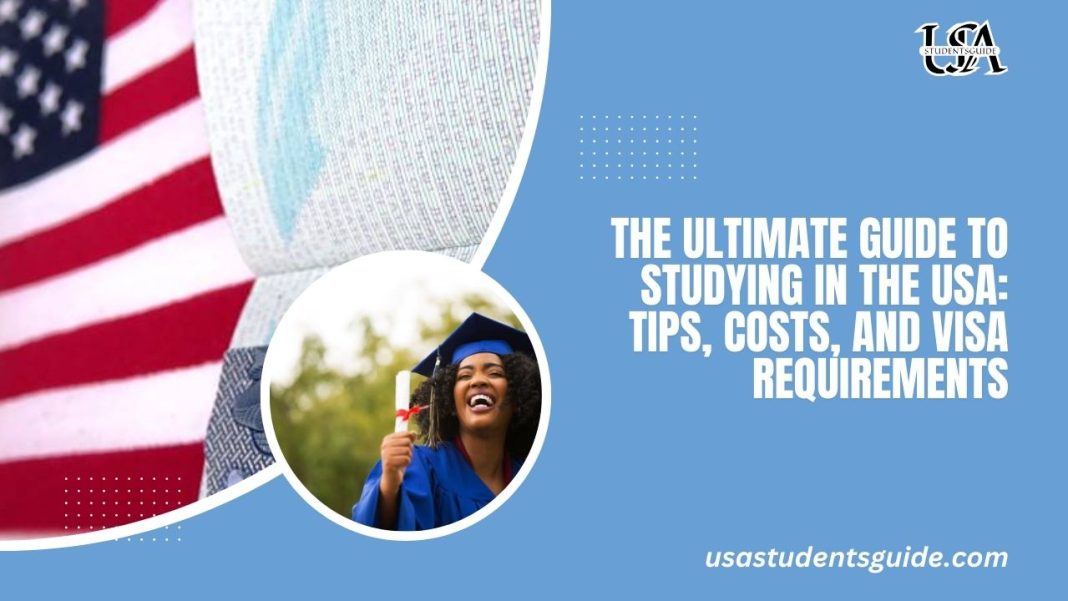Introduction
The Ultimate Guide to Studying in the USA: Tips, Costs, and Visa Requirements – Studying in the USA is a transformative experience that offers world-class education, diverse cultures, and endless opportunities. However, understanding the complexities of applying, financing, and living in the United States can be challenging. This comprehensive guide provides everything you need to know about studying in the USA, including tips, costs, visa requirements, and more.
1. Why Study in the USA?
The USA is home to some of the world’s most prestigious universities and offers a broad range of academic programs. Here’s why thousands of students choose the USA:
- Top-Ranked Universities: With schools like Harvard, MIT, and Stanford, the USA consistently dominates global university rankings.
- Diverse Study Programs: From liberal arts to STEM fields, the USA offers diverse courses that cater to various interests and career goals.
- Research Opportunities: Many universities provide opportunities for cutting-edge research and development, allowing students to work on groundbreaking projects.
- Cultural Diversity: Studying in the USA exposes you to people from all over the world, enriching your learning experience.
2. Understanding the Costs of Studying in the USA
Studying in the USA can be expensive, but understanding the costs upfront can help you plan better.
Tuition Fees
- Undergraduate Programs: Tuition fees range from $20,000 to $50,000 per year, depending on the institution and course of study.
- Graduate Programs: Costs range from $25,000 to $60,000 per year, with MBA and medical programs often on the higher end.
- Community Colleges: A more affordable option, with fees typically ranging from $6,000 to $20,000 per year.
Living Expenses
- Accommodation: On-campus housing costs between $8,000 and $15,000 per year, while off-campus can vary widely based on location.
- Food and Transportation: Expect to spend around $3,000 to $5,000 annually.
- Health Insurance: Health insurance is mandatory for international students and costs between $500 and $2,000 per year.
Other Expenses
- Books and Supplies: Around $1,000 to $2,000 per year.
- Miscellaneous Costs: Entertainment, travel, and other personal expenses can add another $2,000 to $4,000 per year.
Total Estimated Cost: On average, the total cost of studying in the USA, including tuition and living expenses, ranges from $30,000 to $70,000 per year.
3. Scholarships and Financial Aid
Finding financial aid can significantly reduce your study costs. Here are some top scholarships available:
- Fulbright Foreign Student Program: Offers scholarships for graduate students, young professionals, and artists from abroad to study in the USA.
- Joint Japan/World Bank Graduate Scholarship Program: For students from developing countries pursuing graduate degrees in development-related fields.
- AAUW International Fellowships: Scholarships for women pursuing graduate or postgraduate studies in the USA.
Pro Tip: Start your scholarship search early, and ensure your applications are well-prepared to increase your chances of success.
4. Visa Requirements for International Students
To study in the USA, you will need an appropriate student visa. Here’s an overview of the most common types:
F-1 Visa (Student Visa)
- Purpose: For full-time students enrolled in academic programs, including universities, colleges, and high schools.
- Eligibility: Must be enrolled in an accredited academic institution in the USA.
- Application Process:
- Get accepted into a SEVP-approved school.
- Receive your Form I-20 from the school.
- Pay the SEVIS fee.
- Complete the DS-160 visa application form.
- Schedule and attend your visa interview at the U.S. Embassy or Consulate in your country.
J-1 Visa (Exchange Visitor Visa)
- Purpose: For students participating in exchange programs, including study and work-related programs.
- Eligibility: Must be sponsored by an educational or nonprofit institution approved by the U.S. Department of State.
M-1 Visa (Vocational Student Visa)
- Purpose: For students enrolled in vocational or non-academic programs.
- Eligibility: Similar process to the F-1 visa but specifically for technical or vocational studies.
Visa Processing Tips:
- Prepare for the Interview: Be ready to explain why you want to study in the USA and your plans post-graduation.
- Organize Your Documents: Have all required documents, such as your acceptance letter, financial proof, and visa application forms.
5. Tips for a Successful Study Experience in the USA
- Adapt to the Culture: Embrace the diversity and be open to learning about different cultures and perspectives.
- Stay Organized: Keep track of important dates, including assignment deadlines, visa renewals, and health insurance updates.
- Make Use of Campus Resources: Utilize academic advising, career services, and mental health resources provided by your university.
- Build a Network: Engage in campus activities, join clubs, and connect with professors and peers to build a strong support network.
6. Common Challenges and How to Overcome Them
- Homesickness: Stay connected with family and friends, and find a support group on campus.
- Financial Stress: Budget carefully, seek part-time work opportunities on campus, and continuously look for scholarships.
- Academic Pressure: Manage your time well, seek help from tutors, and attend study workshops.
Conclusion
Studying in the USA offers countless opportunities for academic and personal growth. By understanding the costs, navigating visa requirements, and tapping into available resources, you can make your study abroad experience successful and rewarding. Start your planning early, explore all financial aid options, and prepare thoroughly for the visa process. Your American education adventure awaits!
Ready to begin your journey? Check out our other guides for more tips and resources to help you succeed in your studies in the USA!

